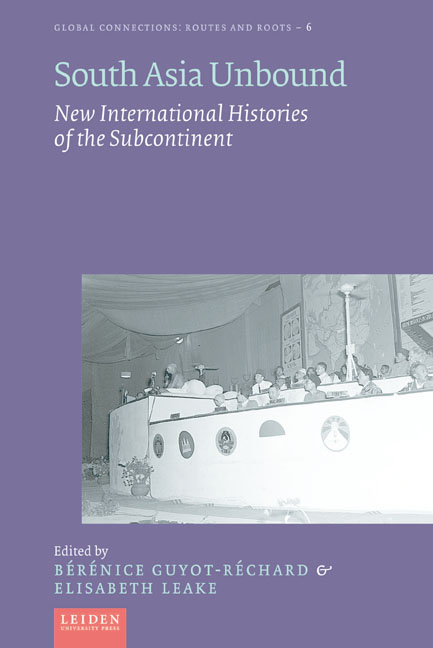Book contents
- Frontmatter
- Contents
- List of Illustrations
- List of Contributors
- Acknowledgements
- Acronyms and Abbreviations
- Introduction. South Asia Unbound
- Part I (Inter)national Orders and State Futures
- Part II From the Transimperial to the International: Lived Uncertainties
- Part III South Asian Roots of the International
- Part IV Ambivalences and Sensibilities of Internationalism
- Afterword
- Index
Part IV - Ambivalences and Sensibilities of Internationalism
Published online by Cambridge University Press: 04 January 2025
- Frontmatter
- Contents
- List of Illustrations
- List of Contributors
- Acknowledgements
- Acronyms and Abbreviations
- Introduction. South Asia Unbound
- Part I (Inter)national Orders and State Futures
- Part II From the Transimperial to the International: Lived Uncertainties
- Part III South Asian Roots of the International
- Part IV Ambivalences and Sensibilities of Internationalism
- Afterword
- Index
Summary
South Asian internationalism emerged in many spheres, and efforts to create truly “postcolonial” cultures within newly independent nation-states offered provocative arenas through which (inter)national notions of citizenship and belonging were inculcated. Equally, internationalism remained its own source of contestation, and individuals and communities could, and did, reject global entanglements. Internationalism, in other words, could be a source of both opportunity and ambivalence. This last section draws attention to ways in which internationalist sensibilities were both developed and actively denied. Various technologies were deployed to foster international sensibilities. South Asian state elites asserted their right to govern and mobilize citizens through mediums such as radio and literature, engineering a sense of national identity and participation; equally, their opponents used the same means to give voice to competing visions of the national and international. Yet there also existed individuals who, in their own ways and for very different personal and ideological reasons, rejected internationalism in favour of other struggles and sensibilities – at least for parts of their lives. This last section explores ways and means of relating to internationalism across this spectrum.
Stephen Legg provides a much-needed study of Dr B.S. Moonje, an interwar proponent of Hindu reformism and anti-Muslim activist who remains poorly accounted for in scholarship on Hindu nationalism. Moonje's communalist turn began in the mid-1920s, but it was his experience attending the Round Table Conference of 1930-2 that solidified his ideas – largely because of his decisive rejection of the cosmopolitanism he witnessed in London and his international interactions at the conference and during the long sea voyage.
Ali Raza's chapter demonstrates how Pakistani progressives, struggling against an increasingly authoritarian state, used literature, and particularly the process of (re)writing histories of Pakistan, to rethink their country's place within South Asia and international socialist networks. They further rooted Pakistan's past, present, and future in a broader Afro-Asian milieu through which decolonizing states had the collective responsibility of reshaping postcolonial culture and rejecting ongoing imperial repression.
Mejgan Massoumi traces the history of radio programming in Afghanistan, demonstrating its origins in processes of international collaboration. While Afghan elites sought to use radio to extend the state's reach to its citizens, Afghan artists used the radio waves to their own ends, sharing songs that melded local and global sonic influences and, at times, surreptitiously critiqued state motives.
- Type
- Chapter
- Information
- South Asia UnboundNew International Histories of the Subcontinent, pp. 223 - 226Publisher: Amsterdam University PressPrint publication year: 2023

